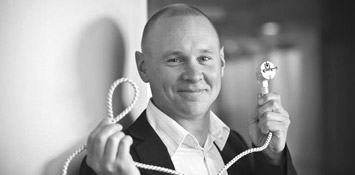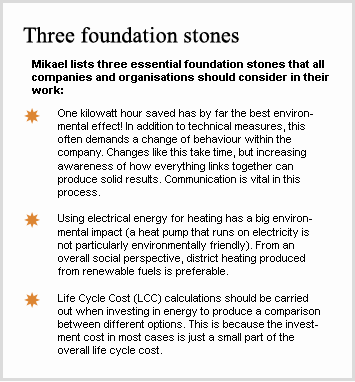
Focus on environmental work pays off
With global warming, the environment has literally become a burning issue. Coor has the expertise that can help clients deal with their energy requirements in a way that is both financially and environmentally sustainable. With the right focus, environmental work pays off – for the company as well as the environment!
There are many views as to what constitutes efficient, sustainable energy provision. No real surprise, then, that many companies and organisations find it hard to gain an overview not only of their own energy situation, but also of the cost saving potential.
Mikael Olsson is one of Coor’s experts who helps companies and organisations reduce their energy costs. According to him, a comprehensive strategy can reduce energy costs as well as the global environmental impact. It does require a broader perspective, however.
“A common error is to view energy supply and its environmental impact as a local issue. It’s not. To be effective, you have to raise your sights and tackle the issue from a global perspective. The environment doesn’t care about national boundaries. The Nordic power systems are connected to the European ones, and rationalisation or an increase in power production in Sweden has consequences in Europe.”
To make a complete, fully comprehensive evaluation, the current energy use of the operation must first be analysed. One important focus area is electricity consumption, as this is the energy form that has the greatest impact on the environment.
“All energy use affects the environment, and conversion to electrical energy is one of the processes with the greatest impact. The reason is that the European energy supply system always has fossil-fired power stations that produce the marginal electricity that is used. Marginal electricity refers to the last few percent of electrical energy added to the European power system. This electricity is produced in coal-fired power stations.”
Reducing electricity consumption first reduces marginal electricity, i.e. coal-fired energy, which in turn has a direct impact on the environment according to Mikael Olsson.
“Every kWh a company saves reduces the amount of combusted coal in Europe. Consequently, greenhouse gas emissions from coal-fired power stations also decrease. What’s more, converting coal to electrical power is expensive. For instance, 100 percent coal energy is converted to only 30 percent electrical energy. The remaining 70 percent turns into waste heat. Ultimately, our aim is to help our clients make financially and environmentally sound choices, and an understanding of energy systems is a key factor,” continues Mikael Olsson.
Some of the practical ways in which Coor assists companies include checking whether they are paying too much energy tax and acting as an expert in the energy procurement process. According to Mikael Olsson, many companies are paying too much.
“When purchasing energy, an understanding of the bigger picture as regards energy systems is a distinct advantage. The best results are achieved from a complete review of all the client company’s energy-related costs, with the aim of reducing them.”
Coor also looks at the way in which energy systems in a building or industrial plant work in practice.
“Are the systems being run optimally? Are there systems that work against each other? There are all kinds of questions that need analysing and answering. The result of this process leads to a number of proposed improvements, which in turn lead to lower energy costs once they’re implemented. Generally speaking, there is tremendous potential in this area,” concludes Mikael Olsson.

Facts about Coor’s energy-related and environmental services
The main aim of Coor’s services is to drive and develop the way clients run and maintain their energy systems.
Some of our services:
- Contract analysis, contract strategy and procurement support
- Energy tax optimisation
- Subscription monitoring and optimisation
- Energy administration (compiling, processing and reporting media statistics)
- Climate accounting (environmental burden in the form of CO2, based on energy consumption)
- Key ratio analyses for energy/media
- Forecast control for energy (possibility of individual goal orientation for operating engineers)
- Energy rationalisation (mapping, analysis, financing and implementation)
- Operational optimisation
